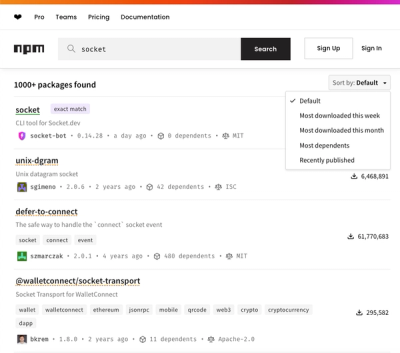
Security News
npm Updates Search Experience with New Objective Sorting Options
npm has a revamped search experience with new, more transparent sorting options—Relevance, Downloads, Dependents, and Publish Date.
simple-oauth2-facebook
Advanced tools
This library is a wrapper around Simple OAuth2 Library
Specially made for Authorization Code Flow with Facebook.
Latest Node 8 LTS or newer versions.
npm install --save simple-oauth2 simple-oauth2-facebook
or
yarn add simple-oauth2 simple-oauth2-facebook
const simpleOAuth2Facebook = require('simple-oauth2-facebook');
const facebook = simpleOAuth2Facebook.create(options);
facebook object exposes 3 keys:
access_tokenSimpleOAuth2Facebook comes with default values for most of the options.
Required options
| Option | Description |
|---|---|
| clientId | Your App Id. |
| clientSecret | Your App Secret Id. |
| callbackURL | Callback configured when you created the app. |
Other options
| Option | Default | Description |
|---|---|---|
| scope | ['email'] | https://developers.facebook.com/docs/facebook-login/permissions |
| state | '' | Your CSRF anti-forgery token. More at: https://auth0.com/docs/protocols/oauth2/oauth-state |
| returnError | false | When is false (default), will call the next middleware with the error object. When is true, will set req.tokenError to the error, and call the next middleware as if there were no error. |
| authorizeHost | 'https://facebook.com' | |
| authorizePath | '/dialog/oauth' | |
| tokenHost | 'https://graph.facebook.com' | |
| tokenPath | '/oauth/access_token' | |
| authorizeOptions | {} | Pass extra parameters when requesting authorization. |
| tokenOptions | {} | Pass extra parameters when requesting access_token. |
const oauth2 = require('simple-oauth2').create({
client: {
id: process.env.FACEBOOK_APP_ID,
secret: process.env.FACEBOOK_APP_SECRET
},
auth: {
authorizeHost: 'https://facebook.com/',
authorizePath: '/dialog/oauth',
tokenHost: 'https://graph.facebook.com',
tokenPath: '/oauth/access_token'
}
});
router.get('/auth/facebook', (req, res) => {
const authorizationUri = oauth2.authorizationCode.authorizeURL({
redirect_uri: 'http://localhost:3000/auth/facebook/callback',
scope: ['email']
});
res.redirect(authorizationUri);
});
router.get('/auth/facebook/callback', async(req, res) => {
const code = req.query.code;
const options = {
code,
redirect_uri: 'http://localhost:3000/auth/facebook/callback'
};
try {
// The resulting token.
const result = await oauth2.authorizationCode.getToken(options);
// Exchange for the access token.
const token = oauth2.accessToken.create(result);
return res.status(200).json(token);
} catch (error) {
console.error('Access Token Error', error.message);
return res.status(500).json('Authentication failed');
}
});
const simpleOAuth2Facebook = require('simple-oauth2-facebook');
const facebook = simpleOAuth2Facebook.create({
clientId: process.env.FACEBOOK_APP_ID,
clientSecret: process.env.FACEBOOK_APP_SECRET,
callbackURL: 'http://localhost:3000/auth/facebook/callback'
});
// Ask the user to authorize.
router.get('/login/facebook', facebook.authorize);
// Exchange the token for the access token.
router.get('/login/facebook/callback', facebook.accessToken, (req, res) => {
return res.status(200).json(req.token);
});
FAQs
A simple Node.js client library for Facebook OAuth2
We found that simple-oauth2-facebook demonstrated a not healthy version release cadence and project activity because the last version was released a year ago. It has 2 open source maintainers collaborating on the project.
Did you know?

Socket for GitHub automatically highlights issues in each pull request and monitors the health of all your open source dependencies. Discover the contents of your packages and block harmful activity before you install or update your dependencies.

Security News
npm has a revamped search experience with new, more transparent sorting options—Relevance, Downloads, Dependents, and Publish Date.

Security News
A supply chain attack has been detected in versions 1.95.6 and 1.95.7 of the popular @solana/web3.js library.

Research
Security News
A malicious npm package targets Solana developers, rerouting funds in 2% of transactions to a hardcoded address.